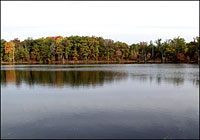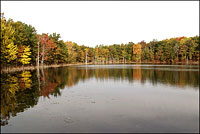Until two years ago, the 40,550 generally well-behaved Midwesterners of Mecosta County, Mich., regularly attended church, sent their children off to school on yellow buses, and never for a moment worried that their clean, freshwater supply would ever run dry. Mecosta County, after all, sits near the center of Michigan’s lower peninsula, which itself sits at the center of the largest supply of freshwater on Earth.

A Mecosta County battleground.
Photo: Jeff Sapp, MCWC.
Then came the water war.
On Dec. 6, 2000, the Perrier Group of America, a subsidiary of Swiss-based Nestle, the world’s largest food company, applied to the local health authorities for permission to drill two water wells on an 800-acre private hunting preserve in the county’s southern reaches. The company’s purpose: to establish a source for a new bottling plant to ship its popular Ice Mountain brand of spring water throughout the Upper Midwest.
Five weeks later the permits were granted. The approvals touched off a stunningly fierce debate about who controls Michigan’s underground reservoirs of freshwater — water so abundant and pure that half of the state’s 9.9 million residents draw it straight from the ground. Although Perrier paid handsomely to smooth the way in Michigan — it hired a public affairs group to massage the media and a respected political consultant to guide needed permits through the regulatory agencies — its arrival in Mecosta County has been greeted with lawsuits, legislative proposals to strengthen the government’s authority to manage water, and political unrest so significant that it has divided the state Republican Party and is influencing the 2002 Michigan gubernatorial campaign. Indeed, the fight over freshwater may be the most significant environmental issue in the country when it comes to affecting how voters will behave at the polls come November.
Perhaps most important, Perrier’s presence has generated new public awareness that free trade, globalization, climate change, population expansion, and other worldwide mega-trends are turning the Great Lakes into ever more prominent targets for resource exploitation. On the 30th anniversary of the federal Clean Water Act, the granddaddy of all water protection statutes, Mecosta County is suddenly the epicenter of a new public reckoning over the security of the Great Lakes — where 20 percent of the world’s surface freshwater is stored — and the underground aquifers that supply them. In a world where clean, freshwater is becoming ever more scarce, the fate of Perrier in Mecosta County will have legal, political, and environmental ramifications for every Great Lakes state and far beyond.
Water in the Court
The Perrier case is headed to the halls of justice next year — but long before it gets there, it will be tried by the public in the courtroom of Michigan’s fast-approaching gubernatorial election. Both major party candidates have publicly and repeatedly expressed their resolve to modernize state water policy to block other multinational corporations from privatizing, bottling, and selling hundreds of millions of gallons of Michigan’s groundwater annually across state lines. That both candidates are voicing those sentiments — which are shared by the majority of state residents, according to opinion polls — is due in large measure to the work of a group of Mecosta County residents who call themselves Michigan Citizens for Water Conservation.

Walls of justice: the Mecosta County
Courthouse.
Photo: Jeff Sapp, MCWC.
Thirteen months ago, MCWC filed a lawsuit arguing that water, like air, is a common resource that is held in public trust and should be managed for the public benefit. If commercial activity such as Nestle’s bottling plant is sanctioned by the state, the group asserts, Michigan could become the target of massive diversions of freshwater to thirsty destinations on this continent and overseas. By defining and promoting water as merchandise, the argument continues, the company is vastly increasing the vulnerability of Great Lakes water to development, exploitation, and overuse.
The Perrier Group, which recently changed its name to Nestles Waters of America, says such arguments have no basis in Michigan law. The company’s lawyers contend that there is no difference between what Nestles Waters is doing and what dozens of other companies do when they pump groundwater to make soft drinks, brew beer, prepare fruits and vegetables for packing, or any of countless other commercial activities.

Downstream from the wells.
Photo: Jeff Sapp, MCWC.
Moreover, say executives, the company’s extensive groundwater-monitoring program in Mecosta County shows that its withdrawal of as much as 576,000 gallons per day is “insignificant” in an underground reservoir that holds billions of gallons. According to scientists working for the company, the disappearance of more than 210 million gallons per year will go virtually unnoticed in a Great Lakes basin containing 6 quadrillion gallons, or about 3 billion times as much. Far from hurting the region, the company argues, the bottling project will create up to 200 jobs and be an economic boon.
In interviews, legal authorities generally agreed that the Michigan citizens group will face an uphill struggle to prove that Nestle’s use of Mecosta’s groundwater is “unreasonable” under state law. Michigan’s water policy — what there is of it — is based on the 19th-century belief in an unlimited abundance of freshwater in the state. Thus state law essentially says that anybody can take as much water as they want for free, as long as doing so doesn’t harm anyone else.
Whether or not it is successful, the court challenge against Nestle has already helped Michigan Citizens for Water Conservation close in on one of its primary goals: exposing the weakness of the state’s water statutes and replacing them with rational water laws fit for the 21st century. The work the citizens group is doing to prepare for its day in court has steadily penetrated the public consciousness and became a political issue with an uncommonly long reach in and beyond Michigan.
Nestle Crunch
For the people of Michigan, the Nestles Waters case is doubly galling. It’s bad enough that a rich and powerful outsider plans to snatch up the state’s water for free and sell it for a fortune; it is worse that the company was encouraged by a consummate insider — Michigan’s Republican governor, John Engler. The Engler administration has awarded Nestle nearly $10 million in local property and state education tax abatements, job training, and infrastructure grants to take Michigan’s water. It’s as though the king of Saudi Arabia allowed Exxon to tap his oil fields for free — only freshwater is more valuable than oil. At the local convenience store, a gallon of bottled water costs more than $8, six times the price of a gallon of gasoline.

Thompson Lake’s water levels are
dropping due to nearby pumping stations.
Photo: Jeff Sapp, MCWC.
The subsidies, which MCWC disclosed, helped to spur three separate citizen blockades since April at the company’s new bottling plant in Stanwood. They also added Mecosta County to the growing number of global hot spots in the worldwide grassroots campaign to block multinational corporations from privatizing water.
All that activity elevated an environmental dispute into a prominent campaign issue for Michigan’s gubernatorial candidates. Not even Engler’s closest allies in the Republican party have defended the subsidies or Nestle’s entrance into Michigan. In fact, Republican leaders, who spent more than a decade preaching the benefits of the free market and deregulation, have done just the opposite. Lieutenant Gov. Dick Posthumus, the Republican gubernatorial candidate, has proposed a “Marshall Plan” to protect the Great Lakes. The plan includes new water legislation and a much more activist state government to prevent such diversions “now or ever.”
Attorney General Jennifer Granholm, the Democratic candidate who is leading by 12 percentage points according to a recent poll, has offered a more specific proposal. She promised, if elected, to develop a new comprehensive water law that bases decisions about water use on how withdrawals affect the environment. She told a Grand Rapids audience earlier this year, “I will lead the fight to enact a state water-protection statute that will base decisions on future water use on what is right for the ecosystem and therefore the people of Michigan in the long run.”
In no other Midwest state, and perhaps none nationwide, has an environmental issue gained such electoral prominence during this election cycle. “What happened with that bottling plant has steadily grown into a major issue in Michigan that is not only about the environment but also about how secure people feel about their future here,” said Andy Buchsbaum, a lawyer and director of the National Wildlife Federation’s Great Lakes Natural Resource Center in Ann Arbor.
There is no doubt that Nestles Waters anticipated that its entry into Mecosta County would stir controversy. Periodic shortages of water around its plants in Florida and Texas had already sparked citizen protests and greater state scrutiny. Just before arriving in Michigan, Nestles Waters had abandoned a proposal to build its new Midwest bottling plant in Wisconsin after a bruising fight with local residents.
But whatever Michigan might bring the company in terms of corporate headaches, the potential profits were worth the fuss. Nestles Waters, the 500-pound-gorilla of the American bottled water industry, bottles the Ice Mountain brand in the Midwest, Poland Springs in the East, and 13 other brands in 75 bottling plants nationwide. The company controls a third of the $6.8 billion national bottled water market, which has grown 18.4 percent since 2000, according to Beverage Marketing Corp., a New York-based research and consulting firm.

Sic ’em, Sikkema.
The question now is whether Nestle is the first in a long line of multinational marketers that will dip their straws in Michigan’s pure water for free — or potentially the last. The Michigan citizens group is trying to oust the company; the gubernatorial candidates say they are ready to pass legislation to make sure other businesses don’t follow Nestle’s lead. And state Sen. Ken Sikkema, a Republican from Grandville who began his political career far enough to the right that he authored a Michigan law to limit government’s authority to oversee natural resources, found in the Nestles Water case an opportunity to track back to the moderate middle. Sikkema, who chaired a legislative task force on the Great Lakes last year, introduced legislation this year that would give local and state government officials authority and resources to vastly step up their power to regulate water.
One of Sikkema’s proposals would even require communities to confirm that adequate supplies of groundwater were available for future needs before large water withdrawals could be considered. It is the first time Michigan has proposed linking a community’s economic development plan with its water supply, and it represents a decisive step forward in the state’s thinking about how to improve the economy and protect the environment.
Michigan is blessed with such abundant natural resources that a 19th-century culture of use and abuse has persisted in spite of a sorry history of home-grown environmental disasters. But Nestle’s venture into the state seems to have jarred people here. It sparked a new kind of discussion about the importance of conserving the essential stuff of life, and the role of the state in doing so. Even militants on the right understand that without adequate water-supply protections and clear rules for withdrawals and exports, the state leaves itself open to marketing schemes from across the globe, and potential shortages and environmental damage at home. For the first time in a Michigan gubernatorial election, candidates from both major parties have seized on the security of the state’s freshwater to introduce the idea that abundance is illusory and there really are limits to growth.

